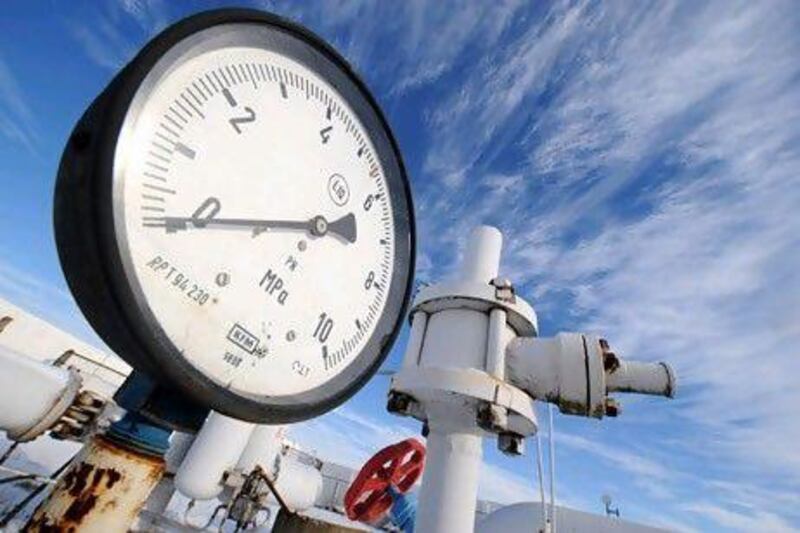When it comes to the fate of the 50 billion cubic metres of natural gas that Azerbaijan hopes eventually to pump every year, the country is keeping all suitors on their toes.
Europe hopes to grab some of those supplies, which means one thing - a pipeline. The only question is which one.
"It's a big plan of our republic," said Mammadov Orkhan Vidadi, the head of the department of interstate economic cooperation in Azerbaijan's ministry of economic development. "And now we can only say that it's under negotiation."
In the western quest for energy security and the desire of Middle Eastern and Central Asian countries to reap the economic benefits of catering to those needs, Azerbaijan is the unlikely decision-maker.
In the many pipeline plans that have been proposed in the past decade to funnel gas to the West from countries such as Iran and Iraq, Azerbaijan's volumes are vital - meaning that when it eventually chooses to back one plan, the others will almost certainly lose out.
Most prominent among those plans is Nabucco, a pipeline with an estimated cost of US$18.4 billion (Dh67.58bn) to $26bn that would have transported gas over 3,900 kilometres from as far as Azerbaijan to Austria. Its shareholders include OMV, the Vienna-based producer quarter-owned by Abu Dhabi, and MOL of Hungary.
So eager were the partners after forming the initial 2002 agreement to push the plan forward that in 2009 MOL and OMV each bought a 10 per cent stake in the Kurdish operator Pearl Petroleum to help guarantee more supplies for Nabucco. Pearl is majority owned by Crescent Petroleum and its subsidiary Dana Gas, both based in Sharjah.
But since then, support for Nabucco has waned. In November, Ashti Hawrami, the Kurdish oil minister, threatened to ship Kurdistan's natural gas straight to Ceyhan, Turkey, where it could be liquefied and shipped by tanker anywhere in the world.
Baku and Ankara have had difficulties coming to an agreement on transit fees, and Baku is still in bilateral negotiations with Bulgaria, Romania and other countries.
The final bell tolled last month, when MOL said that financing the plan was no longer "sustainable" and that it had not approved this year's budget for Nabucco.
"Nabucco was one option that was a very good option," said Badr Jafar, the chairman of Pearl and president of Crescent Petroleum. "It seems to be politics that are being played out at the moment that paints a bit of an unclear future about the Nabucco pipeline."
A range of competitors to Nabucco have emerged. Their benefit is often their size - usually on a scale of about a third of Nabucco's 30 billion cubic metre capacity, making it easier to build a pipeline with fewer nations' commitments and sometimes earning the nickname "Nabucco Lite".
"I'm confident as chairman of a company that has significant gas reserves in the Middle East that there are various highways which one can use to transport these products across into Europe and potentially beyond," said Mr Jafar. "Like any highway, you pay a toll and you use it. So we have no problem. We're not in the business of owning the highways ourselves."
Among the options for Azerbaijan are the South-East Europe Pipeline backed by BP, which is developing Azerbaijan's Shah Deniz gasfield and could benefit from the permits and agreements that have already been put in place for Nabucco.
A shorter and cheaper route, the estimated $5.3bn Trans-Adriatic Pipeline, would link Greece to Italy through Albania and use existing pipelines that connect the Caspian to Turkey and Italy to the rest of Europe.
The Interconnector Turkey-Greece-Italy would follow the same principle but faces hurdles because of the financial crises in Greece and Italy.
One pipeline, however, could eclipse all the others: South Stream, Russia's proposed route through the Black Sea through Bulgaria to Greece, Italy and Austria, which would not use Azeri supplies. Construction is scheduled to begin in December, leaving the Nabucco - or Nabucco Lite - partners a short timetable.
"Which one would be more privileged? Whichever one is more profitable for us, we will decide to accept it," said Etibar Abdullayev, the first secretary of the Embassy of Azerbaijan in the UAE. "Annually, we are exporting 15 billion cu metres. It's not enough for providing all south-east Europe countries, but" - he paused - "it's not small."
twitter: Follow and share our breaking business news. Follow us
iPad users can follow our twitterfeed via Flipboard - just search for Ind_Insights on the app.





